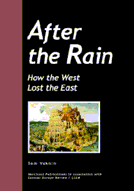Milošević and his cronies stand accused of plundering Serbia's wealth—both pecuniary and natural. Yet, the media tends to confuse modes of action which have often held diametrically opposed goals in different contexts.
Firstly, there was state-sanctioned capital flight. Gold and foreign exchange were smuggled out of Yugoslavia and deposited in other countries. This was meant to provide a cushion against embargo and sanctions imposed on Yugoslavia by the West.
The scale of these operations has been wildly over-estimated at USD four billion. A figure half as big is more reasonable. Most of the money was used legitimately, to finance the purchase of food, medicines and energy products. Yugoslavia would have frozen to death had its leaders not had the foresight to act as they did.
This had nothing to do with party officials, cronies and their family members enriching themselves by "diverting" export proceeds and commodities into private accounts in foreign lands. The culprits often disguised these acts of plunder as sanctions-busting operations. Hence the confusion.
In addition, members of the establishment and their relatives were allowed to run lucrative smuggling and black market operations fuelled by cheap credits coerced out of the dilapidated and politicised "banking" system.
As early as 1987, a network of off-shore bank accounts and holding companies was established by Serbia's Communist Party and, later, by Yugoslavia. This frantic groping for alternatives reached a peak during 1989 and 1991 and after 1992 when accounts were opened in Cyprus, Israel, Greece and Switzerland and virtually all major Yugoslav firms opened Cypriot subsidiaries or holding structures. Starting in 1991, the Central Bank's gold (and a small part of the foreign exchange reserves) were deposited in Switzerland (mainly in Zurich).
A company by the name of Metalurski Kombinat Smederevo (MKS)—renamed Sartid after its bogus privatisation—was instrumental in this through its MKS Zurich subsidiary. MKS was a giant complex of metal processing factories, headed by a former Minister of Industry and a Milošević loyalist, Duško Matković. The latter also served as deputy chairman of Milošević's party.
The lines between party, state and personal fortunes blurred fast. Small banking institutions were established everywhere, even in London (the AY Bank) and conducted operations throughout the world. They were owned by bogus shareholders, out of the reach of the international sanctions regime.
Out of harm's way
When UN sanctions were imposed in stages (1992 to 1995), the state made sure its export proceeds were out of harm's way and never in sanctions-bound UK and USA banks. The main financial agent was Beogradska Banka and its branch in Novi Sad. In a series of complex transactions involving foreign exchange trades, smuggled privatisation proceeds and inflated import invoices, it was able to stash away hundreds of millions of dollars.
This money was used to finance imports and defray the exorbitant commissions, fees and costs charged by numerous intermediaries. Yugoslavia (and the regime) had no choice—it was either that or starvation, freezing and explosive social discontent.
Concurrently, a massive and deeply criminalized web of smuggling, illegal (customs-exempt) imports, bribe and corruption has stifled all legal manufacturing and commerce activities. Cigarettes through Montenegro, alcohol and oil through Romania, petrol, other goods (finished and semi-finished) and raw materials from Greece through the Vardar river (Macedonia), absolutely everything through Croatia and drugs from Turkey (and Afghanistan).
UN personnel happily colluded and collaborated—for a fee, of course. The export of commodities—such as grain or precious metals (gold, even uranium)—was granted in monopoly to Milošević stalwarts.






